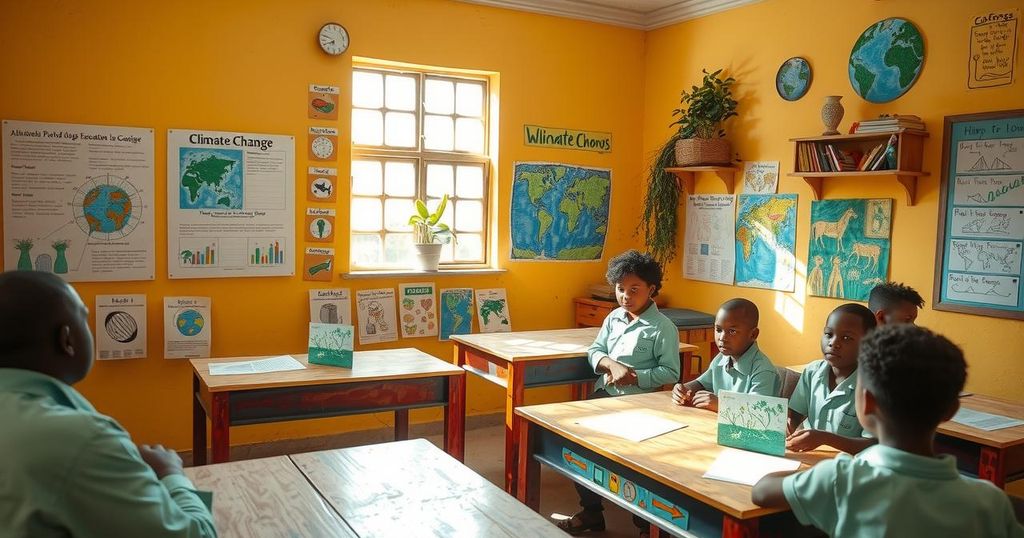Confronting Climate Change: The Educational Journey of Zimbabwean Children
Climate change in Zimbabwe presents daily challenges affecting young students, including unpredictable rainfall, water scarcity, and severe storms. Educators like Fungai Makureke and Priscilla are implementing climate education, supported by UNICEF and KOICA, to empower students. Children like Mollene Masiya and Tapfuma Bhasikoro express a desire to learn about climate change and inspire change within their communities, reflecting optimism amidst adversity.
In Zimbabwe, climate change has shifted from a theoretical concern to a pressing reality affecting daily life. Communities are facing failures in agriculture, water shortages, and extreme weather events, which collectively illustrate the challenges posed by a warming planet. Young learners in rural Masvingo are among those adjusting to these changes, as they prepare to become part of the next generation dedicated to addressing these concerns.
At Sikato Primary School, educator Fungai Makureke highlights the unpredictability of rainfall patterns that once followed a consistent cycle. She notes, “Now, we don’t know what to expect. The rains come late, or sometimes not at all. Our fields remain dry, and the community suffers.” The recent El Niño-driven drought has exacerbated crop failures and water scarcity, worsening the livelihood struggles of families in the area.
With the support of the Korea International Cooperation Agency (KOICA), UNICEF collaborates with the Ministry of Primary and Secondary Education and the Ministry of Environment, Climate and Wildlife to incorporate climate education into Zimbabwean classrooms. This initiative equips educators like Priscilla with Climate Education Teacher Training Modules, aiming to nurture children’s understanding of climate issues. “I want to help children understand what’s happening around them—and what they can do about it,” she states.
For eleven-year-old Mollene Masiya, a Grade 5 student from Chitembere Village, the connection between rainfall and food security is evident. “When the rains come, there is food,” she explains, while also expressing the hardships of fetching water over long distances. Her early encounter with the term climate change sparked a desire to learn more, showcasing the importance of education in cultivating awareness among young minds.
In Magwa Village, fourteen-year-old Tapfuma Bhasikoro has witnessed the destructive power of severe storms firsthand. He recounts, “Sometimes the storms are so strong, they tear off the roofs from classrooms and homes,” describing how such weather previously forced students into overcrowded environments due to school damage. Despite the obstacles, Tapfuma conveys a sense of hope, believing that learning about climate change can inspire change and foster better environmental practices.
The impact of climate change in Zimbabwe is acutely felt by its younger population, who are beginning to confront these realities through education and community action. Initiatives supported by organizations like UNICEF and KOICA aim to enhance climate literacy among youth, empowering them with the knowledge to adapt and influence future practices. The resilience and hope demonstrated by students illustrate the vital role that education plays in preparing the next generation for a sustainable future.
Original Source: www.unicef.org




Post Comment